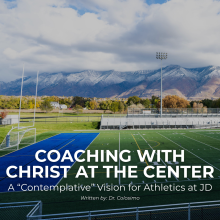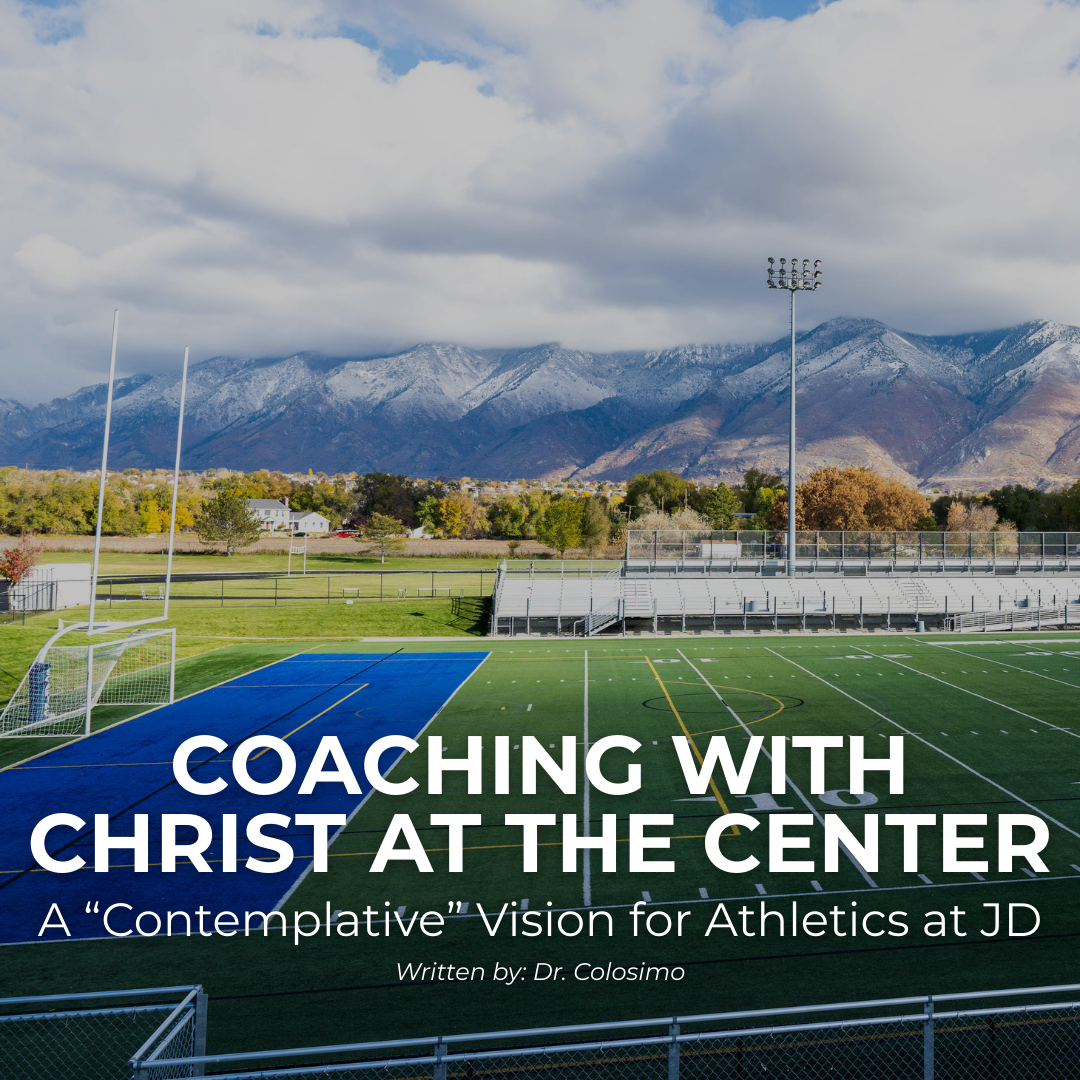
Coaching with Christ at the Center: A "Contemplative" Vision for Athletics at JD.
The early morning field is wet with dew. The stadium lights flicker on. Somewhere, a whistle pierces the chill air across the grass. A girl jogs on the track nearby, earbuds in, carrying more than just a water bottle — carrying hopes, doubts, and maybe even unspoken prayers.
Before the school buzzes awake, before the scoreboard is lit, before drills and reps and rosters take over, the space is quiet — a kind of pause before the movement begins. A sacred breath before the rhythm of effort, growth, and team begins again.
And here we are — not just coaches, but instigators of human character. Not just strategists, but shepherds. We are given more than just a team. We are given souls-in-formation.
But how do we coach with that in mind in a world that celebrates speed, toughness, results, and noise?
We begin by remembering that we coach in the presence of Christ — not as a slogan, not as a locker room cross, but as a living reality. The Incarnation — Christ entering into our human experience — didn’t happen once 2,000 years ago. It happens daily. It happens now. It happens at Juan Diego.
“In Him we live and move and have our being.” (Acts 17:28)
Christ isn’t found only in the chapel or at Sunday Mass. He’s present in the exhaustion after a game. In the athlete trying to find their worth in stats. In the kid showing up early — not for the drills, but for a little bit of belonging. In the tension between teammates. In our own quiet decisions when no one’s looking.
To coach at Juan Diego Catholic High School is to believe that every field, every court, every locker room is holy ground — a place where discipline and compassion, resilience and mercy, competition and community live together in Christ.
Coaching with a "Contemplative" Heart
But how do we stay anchored in that Christ-centered vision when the season picks up, when there are schedules to manage, plays to memorize, and wins to chase?
Our path is what Churches call a “contemplative stance.”
The word — contemplative — might seem more at home in a monastery or on a mountain top than a field or a gym. But at its heart, it means something deeply practical: it’s paying attention to what matters most.
To be “contemplative” is to be fully present — to slow the pace of an athletic season enough to notice what’s going on under the scoreboard. It’s a quiet strength. It watches before reacting, listens before judging, and creates space for grace to do its work — even in loss, even in tension, even in silence.
We see this in Christ Himself. Over and over, He steps away from the crowds, silences the noise, grounds Himself in prayer — not to avoid people, but to see them more clearly.
“He often withdrew to lonely places and prayed.” (Luke 5:16)
To coach like Christ is to be fully engaged — but not consumed. It’s to see frustration and choose calm. To notice effort, not just talent. It’s the pause before calling out a mistake. It’s the decision to speak with correction and kindness.
These small contemplative moments don’t slow down the season — they ground it. They remind us that we coach people, not just players.
Every Athlete is a Sacred Mystery
Each student we coach is more than just potential. More than raw ability. More than what they contribute to a win.
They are a mystery — a sacred story unfolding, often faster than they can understand it.
What if we remembered that even in their mistakes, Christ is already present and working? What if we saw the frustrated player as someone in formation, not failure? What if we remembered that each athlete is already in conversation with God, even if they’ve never named Him?
To coach in this way is to walk alongside them in the long game — the game of character, humility, perseverance, and grace. It is to shape more than bodies. It is to shape souls.
The Field as a Living Sanctuary
It’s easy to see the chapel as the holiest space on campus. But what if we could begin to see the weight room, the huddle, the gym, the diamond, the bus ride home as sanctuaries too?
The team bench becomes a pew of encouragement. The pre-game ritual becomes a liturgy. The silence after a tough loss becomes a place of deep encounter — with one another and with Christ.
“The Kingdom of God is among you.” (Luke 17:21)
Not later. Not when the season ends. Now!
In your team.
In this practice.
In this game.
In these long hours and the little conversations that shape hearts quietly and powerfully.
A Final Blessing
So as you lay out the cones, run the drills, chalk the field, revise the lineup — remember this:
You are not just a coach.
You are a “contemplative” in motion.
You pay attention. You stay present.
You are not just forming athletes.
You are forming leaders, companions, disciples, and saints.
And you are not doing this alone.
Christ walks the sideline with you — unseen, but never absent.
Let the sacred interrupt your strategy.
Let the love of the game give way to love of the person.
Let stillness shape your leadership.
And when the stadium empties and the season ends, may you know this:
The work you do is holy.
The discipline you model echoes in eternity.
And the Christ who once walked among fishermen and tax collectors now walks among our athletes — through you.

.png&command_2=resize&height_2=85)
.png&command_2=resize&height_2=85)
.png&command_2=resize&height_2=85)
.png&command_2=resize&height_2=85)



.png&command_2=resize&height_2=85)

